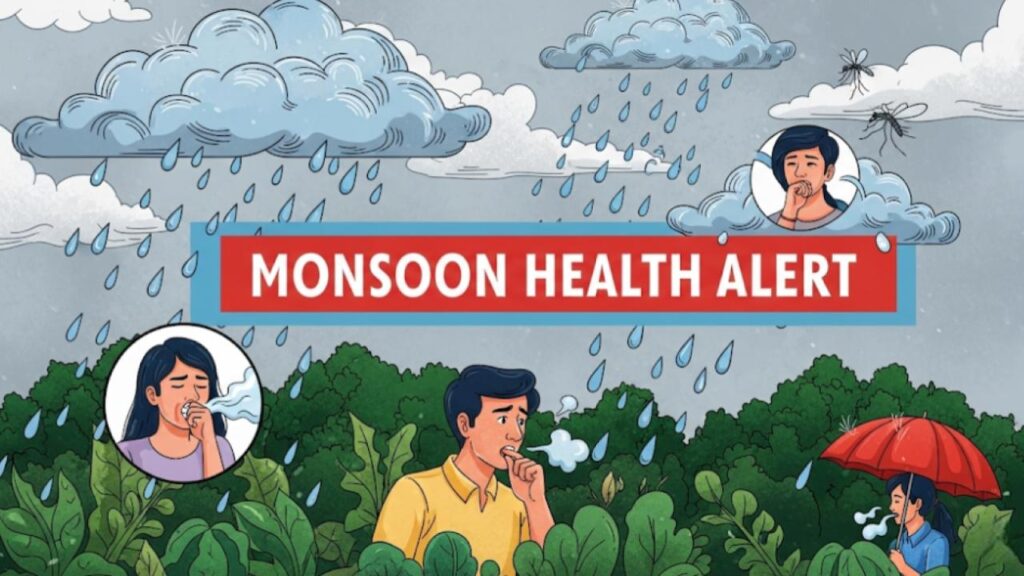As the monsoon season rolls in, it brings with it not only refreshing rains and cooler temperatures but also a host of health challenges, particularly for kids. The sudden shift in weather can create the perfect breeding ground for various illnesses, making it essential for parents and caregivers to stay on top of their children’s health. While children love splashing in puddles and enjoying the cool breeze, it’s important to remember that the monsoon season also brings with it health risks that need to be carefully managed.

Monsoon Health Alert
| Key Area | Information |
|---|---|
| Common Illnesses | Viral fever, influenza, malaria, dengue, diarrhea, cholera, hand-foot-mouth disease, respiratory infections |
| Prevention Tips | Regular hand washing, proper vaccination, avoiding street food, using mosquito repellents, and ensuring proper hydration |
| Symptoms to Watch For | High fever, body aches, fatigue, vomiting, diarrhea, dehydration, rashes |
| Important Vaccines | Annual flu vaccine, typhoid vaccine, and malaria vaccination |
| Hydration and Diet Tips | Ensure your child drinks clean, boiled water, and consumes a balanced diet with plenty of fruits and vegetables |
| When to Seek Medical Attention | If symptoms worsen, such as persistent fever, trouble breathing, or signs of dehydration |
| Link to Professional Advice | WHO Monsoon Health Advice |
Monsoon health risks for kids are real, but with the right precautions, you can protect your little ones from the most common diseases of the season. Vaccination, proper hygiene, and hydration are essential to keep your child safe and healthy. By staying informed and proactive, you can ensure that the monsoon is a fun and safe season for your children.
Common Health Issues During the Monsoon
1. Viral Fever and Influenza
With the temperature and humidity changes during the monsoon, viruses like the flu tend to spread more easily. Viral fevers and influenza (commonly known as flu) are some of the most common illnesses among children during the rainy season. These viruses thrive in damp, humid environments and are highly contagious.
Symptoms:
- High fever
- Sore throat
- Body aches and fatigue
- Runny nose and cough
Prevention:
The best way to protect your child from viral fevers is through vaccination. The flu vaccine is recommended annually, especially during the monsoon season when flu outbreaks are more common. Encourage your children to wash their hands regularly and avoid close contact with sick individuals. Also, keeping your home well-ventilated and avoiding crowded places can reduce the risk of infection.
2. Dengue and Malaria
Mosquito-borne diseases like dengue and malaria are particularly prevalent during the rainy season due to the stagnant water left behind by the rains, providing a perfect breeding ground for mosquitoes.
Symptoms of Dengue:
- High fever
- Severe headache
- Pain behind the eyes
- Joint and muscle pain
- Skin rash
Symptoms of Malaria:
- Fever with chills
- Sweating and fatigue
- Nausea and vomiting
Prevention:
To protect your child from mosquito-borne diseases, eliminate standing water around your home. This includes emptying containers like flower pots, tires, and water tanks where mosquitoes can breed. Using mosquito nets, repellents, and dressing your child in long sleeves and pants can also help minimize the risk of being bitten.
3. Diarrhea and Gastroenteritis
Monsoon rains often cause water contamination, leading to diarrhea and gastroenteritis. These conditions are common in areas with poor sanitation or where access to clean drinking water is limited.
Symptoms:
- Loose stools
- Vomiting
- Abdominal cramps
- Dehydration
Prevention:
To prevent diarrhea, ensure that your child drinks only clean, boiled water and avoids street food during the rainy season. Encourage frequent handwashing with soap and water, especially before meals and after using the restroom. If your child does get diarrhea, make sure to keep them hydrated with oral rehydration solutions (ORS) to replace lost fluids.
4. Cholera and Typhoid
Both cholera and typhoid are caused by bacterial infections from contaminated water or food. These diseases are more common in areas where hygiene and sanitation are not up to the mark.
Symptoms of Cholera:
- Severe watery diarrhea
- Vomiting
- Dehydration
Symptoms of Typhoid:
- High fever
- Abdominal pain
- Weakness and fatigue
- Rash (in some cases)
Prevention:
Vaccinations are available for both cholera and typhoid. Additionally, ensure that your child consumes hygienic food and water, and avoid eating from roadside stalls or places with questionable sanitation practices. Keeping the environment around your child clean is key to preventing these infections.
5. Hand, Foot, and Mouth Disease (HFMD)
HFMD is a common viral infection that spreads rapidly among children during the monsoon season. It’s highly contagious and can spread through direct contact with infected individuals or surfaces.
Symptoms:
- Fever
- Rash or blisters on hands, feet, and sometimes the buttocks
- Sores in the mouth
Prevention:
Encourage good hygiene practices, such as washing hands with soap after using the toilet and before eating. If your child is infected, keep them at home to avoid spreading the virus. Regularly disinfect toys and common areas to reduce the risk of transmission.
6. Respiratory Infections
Respiratory infections, including pneumonia and bronchitis, become more common during the monsoon season due to the humidity and the frequent exposure to damp conditions. Children’s immune systems may not be fully equipped to handle these infections, especially when the weather is inconsistent.
Symptoms:
- Coughing
- Difficulty breathing
- Wheezing
- Fever
Prevention:
To prevent respiratory infections, ensure your child stays dry and warm. A raincoat or umbrella can keep them dry when playing outside. Encourage them to wear layers to maintain body warmth. If your child develops a cough or other respiratory symptoms, consult a doctor for timely treatment.
Practical Tips for Keeping Your Child Safe During the Monsoon
1. Stay Hydrated
With increased chances of dehydration during diarrhea and fever, ensure your child drinks plenty of water, oral rehydration solutions (ORS), and fresh fruit juices to stay hydrated.
2. Maintain Hygiene
Regular hand washing is one of the most effective ways to prevent the spread of infections. Teach your child to wash their hands properly with soap, especially after using the bathroom and before eating.
3. Proper Clothing
Dress your child in light, breathable clothing. During rainy days, make sure they wear waterproof jackets and shoes. Always change them out of wet clothes promptly to prevent fungal infections.
4. Vaccinations
Ensure that your child is up-to-date with the recommended vaccines. The flu vaccine and typhoid vaccine are particularly important during the monsoon.
5. Avoid Outdoor Play During Heavy Rains
While it might be tempting for kids to play in the rain, it’s best to avoid outdoor activities when the rain is heavy. Wet conditions can lead to cold and flu-like symptoms.
6. Mosquito Protection
Use mosquito nets, repellents, and long-sleeve clothing to protect your child from mosquito bites. Clear any standing water near your home to eliminate mosquito breeding grounds.
FAQs
Q1: How do I prevent my child from getting a cold during the rainy season?
A1: Keep your child dry and warm, and encourage them to wear appropriate rain gear. Avoid letting them play in wet conditions, and encourage regular hand washing.
Q2: What should I do if my child develops a fever or cough during the monsoon?
A2: If your child develops a fever or cough, ensure they get plenty of rest and fluids. Monitor their symptoms and consult a doctor if the fever persists or worsens.
Q3: Are there any specific vaccinations I should get for my child before the monsoon?
A3: Yes, vaccines for flu, typhoid, and malaria are recommended, especially if you live in high-risk areas.








